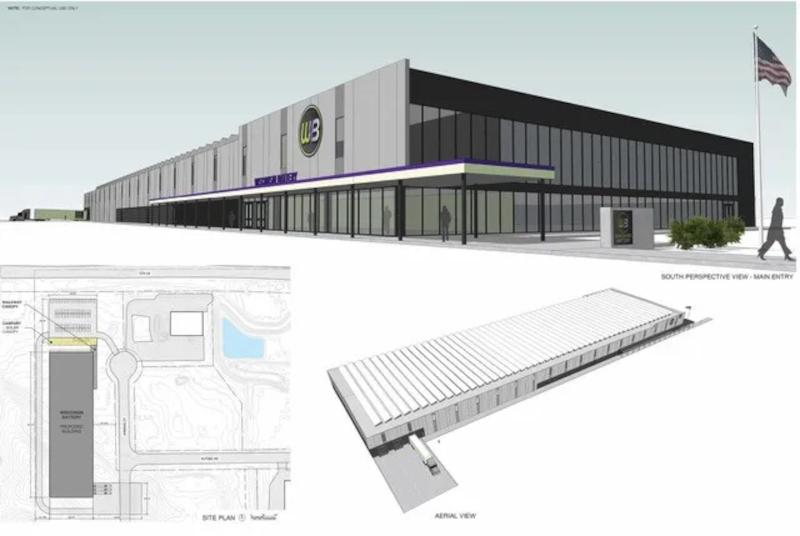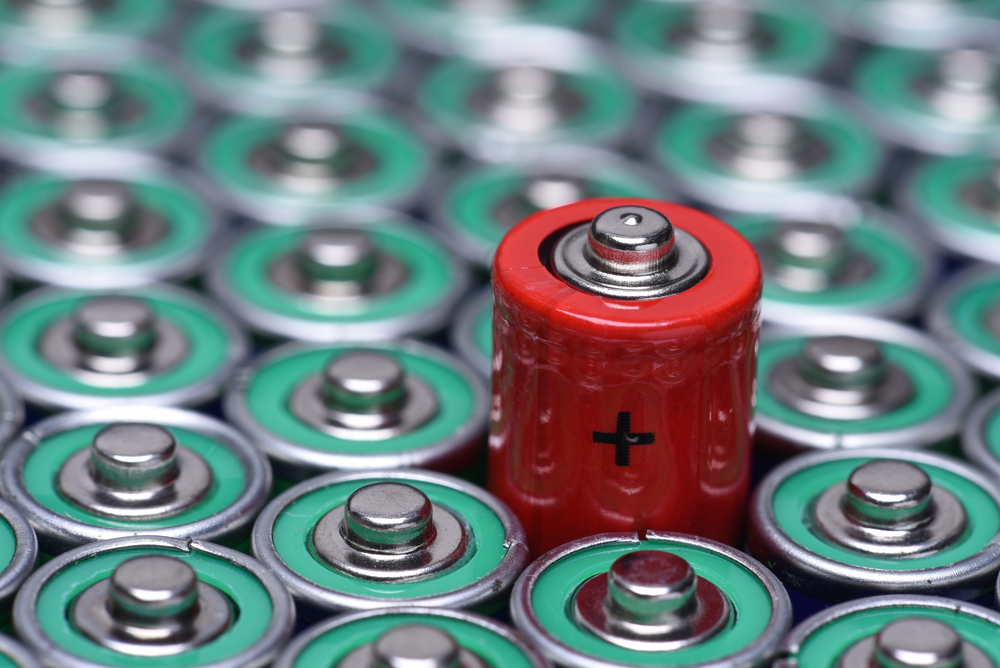As the hemp industry searches for that Next Big Thing, an ambitious startup in Wisconsin said it expects to raise a billion dollars within three to five years to develop a factory to turn out a range of battery products based on hemp carbon.
Wisconsin Battery Co., Portage, a research and development company, hopes to have the factory finished by the end of 2024, then start production in early 2025. Portage officials said the initiative could soften the blow brought by the shutdown of a local Energizer battery plant.
“Initially, our markets will be retail and specialty, we will add OEM (Original Equipment Manufacturer; “white label”) and military early in our future and then hit the EV (electric vehicle) scene,” Jeff Greene, the company’s president, told HempToday.
Industrial hemp’s potential for carbon battery production lies in its bast fibers, the long, strong strands from the bark of the plant. Sourcing and processing that material is more environmentally friendly than more common battery compounds such as graphite and lithium. The hemp-based technology is still under research.
The first products planned by Wisconsin Battery are hearing aid batteries followed by replacements for alkaline batteries (such as AA and AAA). The company will eventually move into rechargeable tool batteries and then electric vehicle (EV) and industrial-scale batteries such as those needed for solar installations, according to Greene.
Financing goals
Wisconsin Battery has a goal to raise $40 million in its first funding round through industrial revenue bonds and corporate bonds, then $50-$100 million through grants in a second round.
“Finally, in 3-5 years when we enter the EV market we expect a $500 million – $1 billion raise through a combination of loans, grants, bonds and potentially an equity raise,” Greene said of the company’s aggressive plans.
Wisconsin Battery Co. this month obtained an option to buy 17 acres of city-owned land for the planned 100,000-square-foot manufacturing plant. The city has agreed to sell the company the land, in a local industrial park, for one dollar, and the Portage city council is considering authorizing $20 million in federal industrial revenue bonds to support the company’s plans in Portage and Fennimore, 100 miles southeast. That’s where Energizer is closing a second plant, and Wisconsin Battery intends to open an additional facility in the future. The scheduled shutdowns at the two Wisconsin Energizer sites will idle more than 300 workers.
Greene said his company has been in discussions with the union that represents the former Energizer employees. Wisconsin Battery will hire 60-70 workers initially, but hopes to eventually grow the payroll to 600 workers in the sixth year, he added.

Tough competition
Can such a startup crack the intensely charged global market for batteries where well-established conventional producers dominate?
“(Portage) Mayor Mitchel Craig said the city is enthusiastic about the project but has also been cautious over the 16 months that city officials have been working with Greene and his team, recognizing that the technology is new and the company is still developing its manufacturing process,” the Milwaukee Journal Sentinel reported following a press conference Jan 9.
Those challenges aside, it won’t be an easy path for hemp batteries:
- The $10 billion global market for alkaline “consumer” batteries is dominated by such household names as Ray-O-Vac, Duracell, Energizer, and Panasonic. The sector is also crowded with additional private-label brands, value brands, and regional players.
- And while the global business in hearing aid batteries is less competitive, it’s a much smaller market – valued $1.5 to $1.9 billion in 2022, with projected moderate growth to $2.7 billion by 2030.
- Finally, according to Statista, the global market for EV batteries reached $359.2 billion in 2022 and was predicted to nearly double in 2023, although figures are not yet final. Sales could top the $1 trillion mark by the end of the century, Statista also forecasts. But that market is also fiercely competitive, with brand-name giants like LG Chem, Panasonic, and Samsung SDI challenging emerging players such as Tesla, BYD, and Contemporary Amperex Technology Co., Ltd.
R&D still needed
In addition to the stiff competition, experts say significant research is still needed on hemp fiber’s application to batteries, and that scaling up production will take years of testing.
For hemp fiber economics to work, a massive buildout of production facilities is needed to create a robust, quality-oriented production chain from the farm to the factory. And those processors will need to turn out consistent supplies of feedstock that meet exacting standards for high-tech applications such as batteries.
A report one year ago indicated that only 20 hemp fiber processing plants are now operating across the entire U.S. that are capable of decorticating hemp straw, with an additional 8-to-12 expected to go online by 2028. That report identified only one such factory in Wisconsin, however; it is unclear at what stage that initiative is, or if it is still in the works.
Experts agree that fiber should be Wisconsin’s main output from hemp, based simply on its northern climate, which is suitable for proven European hemp fiber varieties. But the state recorded only 740 acres of hemp harvested in 2022, according to the annual Hemp Report from the U.S. Department of Agriculture’s National Agricultural Statistical Service (NASS), most of that likely grown for CBD flowers, and little if any for fiber. Total hemp fields for 2023 have yet to be tabulated.
Parent entity
Wisconsin Battery is owned by Sustainable Communities Corp. (SCC), a non-profit “benefit corporation” (a 501(c)(4) – a business structure designed to encourage balancing profits against social and environmental impacts.
In addition to serving Wisconsin Battery as president, Greene serves SCC as Director and Legislative & Government Relations Adviser. As a lobbyist, he has worked in alternative energy, industrial hemp and digital currencies. He is a founder and partner in Natural Life Franchise Corp., a chain of retail stores that specializes in CBD and holistic plants.
SCC, which is based in Ohio, is headed by Michael Sauvante, Chairman and “Chief Architect,” according to its website. The non-profit appears to be the latest iteration of several entities started by Sauvante which date back decades and have operated under such names as Seertech Corp., Rolltronics Foundation and National Commonwealth Group.
According to a 2012 story on San Francisco’s NBC Bay Area local TV outlet, U.S. Bankruptcy Judge J. Craig Whitley in North Carolina said in 2007 that Sauvante’s entities, which claimed to be developing advanced batteries and digital displays, were “all non-operational shell corporations” created “in succession to bilk investors.”
In a later federal bankruptcy hearing in 2008, trustee Richard Mitchell said “what it really was, was a scheme wherein we start a company, we sell stock. We close that company up, transfer the purported technology, and it just keeps going on and on and on.”
According to the NBC story, Sauvante, a “self-described Silicon Valley startup specialist,” “strenuously denied” the characterizations of past businesses linked to his non-profit entity, and criticized Judge Whitley, calling his comments “a parting shot” from the court.
The bankruptcy proceedings, which involved Seertech Corp., ended in 2008 without relieving Sauvante of his debts.
Sauvante’s bankruptcy application came to light as a result of due diligence by officials in Berkeley, California, after he pitched the city council in 2012 on a wholly different idea through National Commonwealth Group Inc.: Using government powers of eminent domain to seize property and annul mortgages to help financially troubled homeowners.
The idea, which surfaced during the U.S. mortgage crisis, was widely discussed but ultimately faced legal and practical challenges that prevented implementation.
Proceeding with caution
Portage officials are proceeding with caution as they consider Wisconsin Battery Co.’s plans.
“We gave them 90 days to provide us with all of their proof of financing and if they can’t produce it in 90 days, then we’ll give them their dollar back,” Mayor Craig told the Journal Sentinel.
“They are a startup company, so we’re being very cautious about how we proceed forward with this … other than the city possibly turning over this property to them, the city has not invested any money in this project, nor will we,” Craig said.

